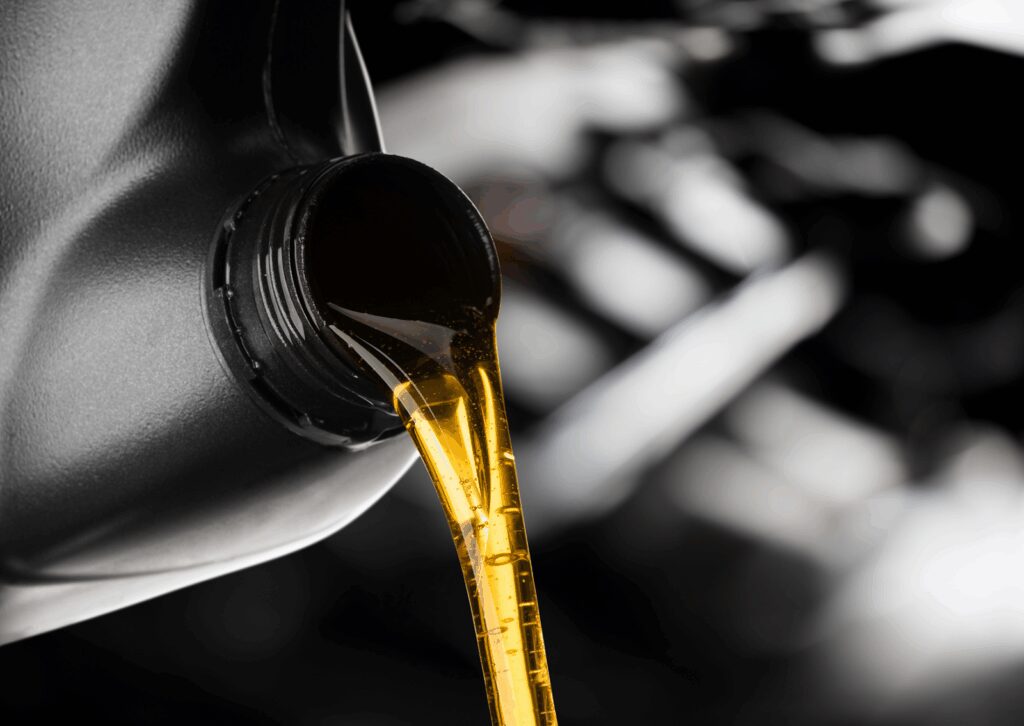Why Is Engine Oil So Important to Your Car’s Health?

Engine oil is the lifeblood of your vehicle’s motor. It serves multiple essential purposes: cooling, cleaning, and lubricating engine components. Without clean oil, your engine cannot reduce friction between moving parts, leading to more heat and increased wear. Fresh oil helps the engine run smoothly by forming a protective layer between metal surfaces, ensuring proper lubrication and preventing unnecessary damage.
In modern cars, both synthetic oil and conventional oil are designed to meet specific performance needs. Over time, however, even the best oil breaks down due to heat, contamination, and regular engine use. When that happens, oil flow becomes restricted, oil passages clog, and the engine loses its ability to operate efficiently. That’s when skipping oil becomes risky.
What Happens If You Don’t Get Regular Oil Changes?

Failing to change your oil at regular intervals leads to a domino effect of issues that compromise your vehicle’s long-term performance and safety. As oil ages, it loses viscosity and becomes thick with dirt and combustion byproducts. The engine has to work harder, resulting in reduced fuel efficiency and more heat. Over time, these conditions can cause severe engine damage.
When you ignore oil change intervals, your oil filter also becomes saturated and ineffective. The dirty oil circulates through the system, reducing its ability to lubricate and cool engine parts. This scenario leads to increased engine wear, more friction, and eventually engine failure if left unresolved (U.S. Department of Energy).
How Does Dirty Oil Impact Fuel Efficiency and Performance?

A poorly lubricated engine must work harder to keep your car running. When friction increases, so does fuel consumption. You’ll likely notice your vehicle burning more gas while delivering reduced performance. Regular oil changes with clean oil help maintain improved performance and fuel efficiency by reducing internal resistance within the engine bay.
This reduced fuel efficiency isn’t just a small nuisance—it’s a warning sign that the oil is no longer functioning properly. Vehicles designed for fuel economy are especially sensitive to improper lubrication. If you’re seeing increased fuel consumption at the pump, dirty engine oil might be to blame.
Can Skipping an Oil Change Lead to Engine Failure?

Absolutely. One of the most direct answers to the question “what happens if you don’t get regular oil changes” is catastrophic engine failure. Neglecting your car’s oil for too long allows sludge and contaminants to build up, obstructing oil passages and compromising oil pressure. The longer the vehicle runs with dirty or low oil, the more severe the engine damage becomes.
When engine parts grind against each other due to lack of lubrication, it doesn’t take long before bearings wear down, pistons seize, or the entire motor fails. In fact, skipping oil changes is one of the leading causes of premature engine failure and costly repairs that could have been easily avoided with basic car maintenance (Consumer Reports).
What Role Does the Oil Filter Play in Keeping the Engine Clean?

The oil filter traps dirt, metal particles, and combustion byproducts before they can circulate through your engine. But filters have a limit. Over time, they become clogged and ineffective, causing the oil to bypass filtration or stop flowing properly. Without an effective filter, dirty oil spreads throughout the system, compounding wear on engine components.
Replacing the oil filter during each oil change ensures clean oil continues to flow, which is especially crucial for older or high-mileage vehicles. Clean oil and a functioning oil filter work hand-in-hand to reduce friction, regulate oil pressure, and extend the life of your motor.
What’s the Difference Between Conventional Oil and Synthetic Oil?

Conventional oil is derived from crude petroleum and refined to a usable product. It’s more affordable but breaks down faster under heat and stress. Synthetic oil, on the other hand, is engineered to perform better at extreme temperatures and resists breakdown longer, which means it supports longer oil change intervals and provides better protection for modern engines.
While synthetic oil might cost more upfront, it often leads to lower maintenance costs in the long run due to better engine protection. Depending on your driving habits and maintenance schedule, your mechanic may recommend one type over the other to help your engine run smoothly and last longer.
How Does Engine Wear Accelerate Without Regular Maintenance?

When you delay or skip an oil change, wear accelerates on moving parts inside your car’s engine. As engine oil degrades, it loses its ability to lubricate and cushion internal surfaces. The result? Increased friction, more heat, and reduced performance. This wear is cumulative and irreversible. Once critical engine parts like the camshaft, pistons, or crankshaft begin to degrade, you face expensive repairs or total replacement.
This increased wear may not be immediately noticeable. At first, your car might feel sluggish, idle roughly, or emit more heat than usual. But over time, the damage snowballs, potentially leaving you stranded with a seized engine and a voided warranty.
How Can Oil-Related Issues Increase Emissions?

Old or dirty oil can indirectly increase emissions by causing the engine to burn fuel less efficiently. When lubrication is compromised, the engine must compensate by working harder. This leads to incomplete combustion, more soot, and higher exhaust output. Increased emissions not only harm the environment but can also cause your vehicle to fail emissions testing, depending on your local regulations.
Furthermore, improper lubrication increases oil consumption. As oil leaks or burns within the engine, your car emits pollutants that contribute to smog and environmental degradation. Regular oil changes help maintain emissions compliance and support cleaner driving.
What Should You Know About Oil Change Intervals and Driving Habits?

While most manufacturers recommend oil change intervals between 5,000 and 7,500 miles, your actual needs depend on your driving habits and vehicle type. Frequent stop-and-go traffic, extreme weather, towing, or short trips that don’t allow the engine to fully warm up can all accelerate oil degradation.
If you’re unsure whether it’s time to change your oil, check your oil level regularly and consult your car’s owner manual. Modern vehicles often have dashboard indicators that alert you when it’s time for an oil change. Don’t ignore them—acting promptly is an essential part of car maintenance that can save you from long-term costs and severe damage.
Where Can You Get Reliable Oil Change Services in Loveland, CO?

If you’re overdue for an oil change or suspect your car’s oil is dirty, it’s time to schedule a service. Athttps://automotiverepairloveland.com, expert mechanics can inspect your oil level, oil filter, and overall engine health to ensure your vehicle is running smoothly. Whether you drive a new car or an older model, staying on top of your regular oil changes is one of the most cost-effective ways to avoid expensive engine repairs, improve fuel efficiency, and keep your warranty valid.
Neglecting oil changes may seem harmless in the short term, but over time, it becomes one of the most expensive mistakes a vehicle owner can make. The cost of a basic oil change is minimal compared to the thousands it could take to replace a damaged motor. Don’t wait for warning lights—proactive maintenance is your best defense against premature wear and breakdowns. Schedule your oil change today!
Final Thoughts
Understanding what happens if you don’t get regular oil changes is more than just car trivia—it’s critical to preserving your engine, fuel economy, and long-term vehicle value. Skipping oil leads to increased friction, heat, emissions, and wear. With proper lubrication and regular oil changes, you extend the life of your car, improve performance, and reduce the risk of severe engine damage. In short, changing the oil is one of the simplest ways to keep your engine healthy.
If you care about your car’s longevity, performance, and reliability, don’t put off your next oil change. Regular maintenance is more than a chore—it’s a commitment to your safety, savings, and peace of mind.
Works Cited
“Changing Your Oil.” U.S. Department of Energy, www.energy.gov/energysaver/changing-your-oil. Accessed 14 July 2025.
“Engine Oil Myths and Facts.” Consumer Reports, 8 June 2021, www.consumerreports.org/car-maintenance/engine-oil-myths-and-facts.
“Oil Changes for Modern Cars.” National Institute for Automotive Service Excellence (ASE), www.ase.com/drivers/oil-change-guidelines. Accessed 14 July 2025.
“Maintaining Your Vehicle.” Environmental Protection Agency (EPA), www.epa.gov/greenvehicles/maintaining-your-vehicle. Accessed 14 July 2025.
“Owner’s Manual and Recommended Maintenance Schedules.” Toyota USA, www.toyota.com/owners/resources/owners-manuals. Accessed 14 July 2025.
Frequently Asked Questions
How often should I change my oil if I mostly drive short distances?
If your typical driving involves short trips under 15 minutes, your engine may not reach optimal temperature often enough to burn off moisture and contaminants. In that case, it's best to follow a shorter oil change interval—typically every 3,000 to 5,000 miles—even if you use synthetic oil. Always consult your vehicle’s owner manual and talk with a trusted mechanic about your specific driving habits.
Can skipping one oil change really cause damage?
While missing one oil change won’t destroy your engine overnight, it starts a cycle of increased wear and reduced performance. Over time, dirty oil loses its ability to reduce friction and heat. Skipping just one interval can accelerate sludge buildup, reduce oil pressure, and cause more long-term damage than most people realize.
Is synthetic oil better than conventional oil for preventing engine wear?
Yes. Synthetic oil is engineered to withstand extreme temperatures and resist breakdown longer than conventional oil. It maintains proper lubrication for a longer period, especially in high-stress or modern engines. While it’s more expensive upfront, it helps reduce friction, improve performance, and extend the life of your car’s engine.
What are the warning signs that my engine oil needs changing?
Common warning signs include a louder engine, decreased fuel efficiency, unusual smells, visible exhaust smoke, or a dashboard oil light. If your engine starts running roughly or feels hotter than usual, these could be signs of old or low oil. Always check your oil level and appearance on the dipstick—dark, gritty oil needs to be replaced immediately.
Will skipping oil changes void my car’s warranty?
Yes, in many cases. Most manufacturer warranties require that you follow the recommended maintenance schedule, including oil changes. Failing to provide proof of regular oil changes—especially if it leads to engine failure—can result in a voided warranty and leave you responsible for costly repairs.




